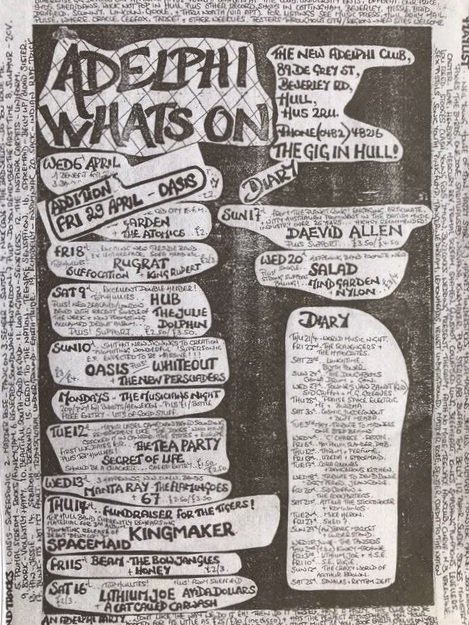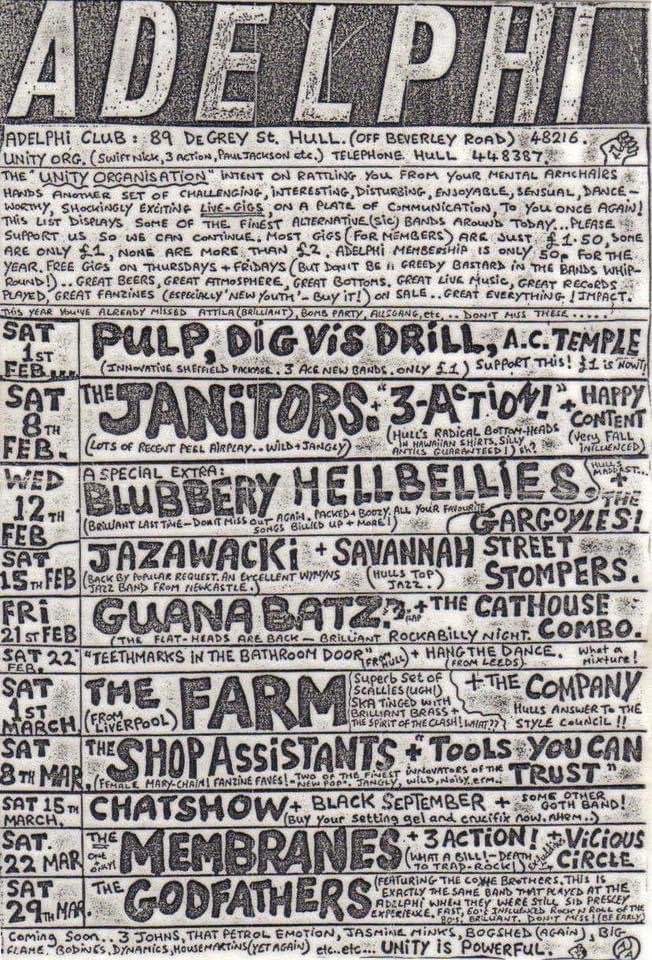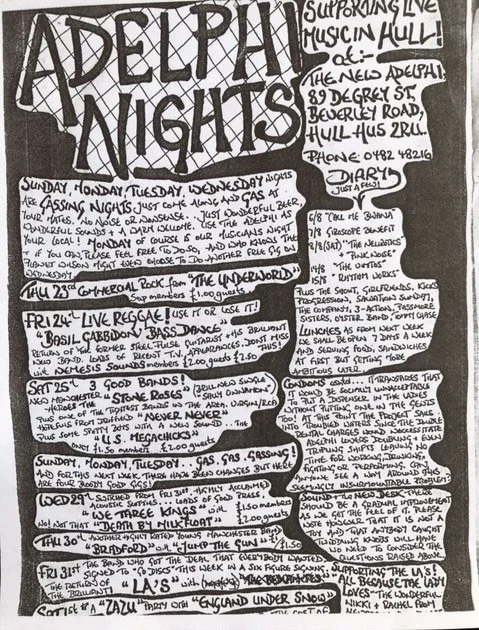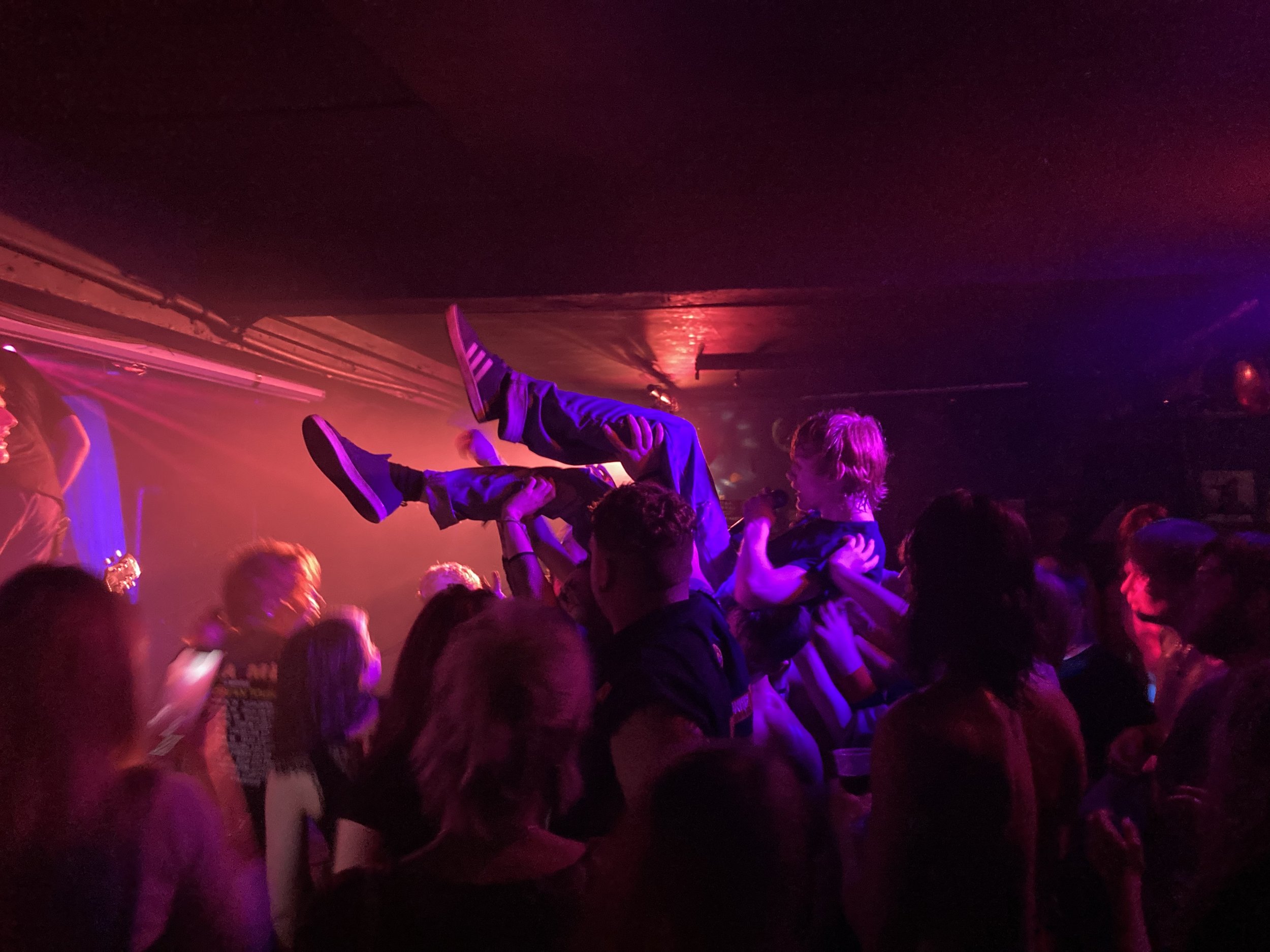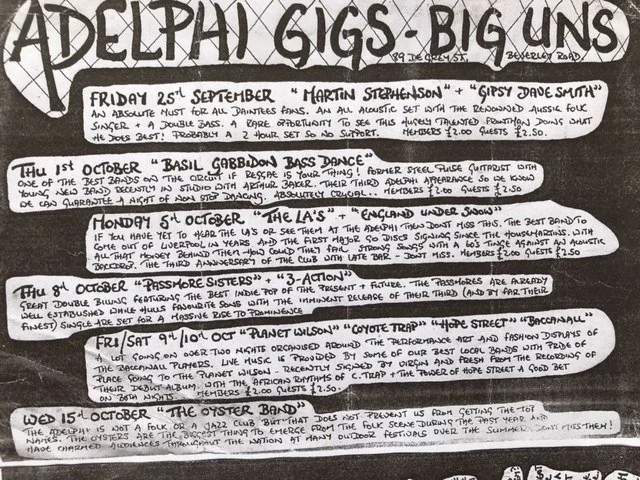Adelphi Flyers: Tribute to the grassroots
Gary Hockney
The Crow’s Nest, a music column by Russ Litten
On the fly with Hull boney fidoe Gary Hockney
For anyone growing up in Hull in the 80s and 90s, The New Adelphi Club was your gateway to the very best live independent music of the era. This prehistoric, pre-digital age also spawned an essential aid to gig-going – the Adelphi Flyer. These oddly ornate monochrome missives featured a list of often bizarre sounding speech-bubble names that promised the casual punter a month’s worth of eclectic musical pickings, along with “five hand-drawn bitters” and a rigorous door policy of “members and boney fidoes only”.
From a 21st century perspective, these flyers read like a Who’s Who of embryonic pop stars – Radiohead, Pulp, The Stone Roses, Primal Scream etc etc. The roll call is long, illustrious, and frequently noted. But what about the lesser known acts who were flushed through the cracks of the so-called indie toilet circuit, never to be seen or heard of again? Wherefore art though, oh Voodoo Dolls and Mambo Taxi? Whatever happened to Jellyfish Kiss or The Chestwigs? And what happened to all the other big local bands of the times, like Pink Noise, The Company and 3-Action?
Gary Hockney is the former singer, bass player and songwriter of 3-Action and he’s the creator and host of a brand new radio show recently launched on the Louder Than War music site that pays homage to The Adelphi and the ongoing spirit of independent music: “Adelphi Club Flyers - Tribute To the Grassroots”.
The show goes out every Sunday between 3pm and 4pm, and takes its content from a selected past flyer. But this is no mere meander down Indie Memory Lane. The show also reports on upcoming gigs and plays bands from the current climate. The first show featured acts from 1988 such as My Bloody Valentine, Conflict and The Flatmates alongside present day artists Ketamine Kow and The Froot.
I asked Gary how it all came about…
“The Adelphi Club flyers often crop up in social media. Some of the runs of gigs in any given month, over the club’s illustrious thirty-nine years, are truly staggering. Staggering in terms of the talent on show and quite often in terms of where the acts were then, and their stories thereafter. Almost like an accidental festival that went on for a month in a terraced house off Beverley Road. Whenever I talk with people about the place, I feel obliged to brag about this amazing legacy and also about the great work that it still does. Referring to the flyers helps put this across.
“Going from that, I’ve listened to Louder Than War Radio for some time now; it plays the stuff I’m into, it doesn’t have any news breaks or ads and the songs played aren’t censored. I noticed they were asking for pitches for new shows, and I really wanted to do something that throws the spotlight on the Adelphi but also, importantly, celebrates grassroots venues everywhere. It made sense to use the flyers as a means of doing this. I pitched it, and Louder Than War were keen.
3-ACTION: ‘Hull’s radical bottom-heads in Hawaiian shirts, silly antics guaranteed’ . From left, Roger Wilde, Gary Hockney, Ian Bolton
“It’s been a nightmare sorting the technology out, but that says more about me than the technology! I’ve also got a real aversion for public speaking, that’s got worse over the years and wanted something that’ll challenge it and force me out my comfort zone. So here we are.”
How do you choose a flyer? Just at random? Does a theme suggest itself?
“The first four shows are chronological, going through the first four decades. Just to establish the club’s history and longevity. But honestly, the flyers just choose themselves, it’s already done and down. I’ve gone through loads and it’s amazing what they unearth after a bit of a dig. Take the second show – I’d heard a few of the bands and heard of a few more. Then when I started choosing the tracks, it blew me away. An obvious theme emerged – all female or female-led bands, each really pivotal in their particular genre. In one month there was the original ‘riot grrrls’ Bratmobile from Washington DC and various UK counterparts who have also gone down as important acts in that field. Subpop ‘bubblegrungers’ Velocity Girl, also from Washington DC, and a really influential US college rock band called Unrest.
“Sometimes it’ll be more eclectic, all over the joint but that’s fine and, I think, it’s going to be the fun of it.
“I’ve been in touch with most of the current acts to tell them they’re on and asked them to share it about. I’ve also tracked some of the older bands down as well and they’ve done likewise, which is great. It takes a fair bit of time but I really want to do this routinely.”
Did you find anything that surprised you in the course of your research?
“Yes, I guess it’s surprising just how much we took it for granted, the amazing performers that graced the stage, for me, particularly in the first ten years or so after Paul Jackson bought the place.
“Surprising also how the club has always managed to keep afloat by having the ethos ‘if the band’s decent, we will have them on’. It’s maybe not the best business model, but it makes the club almost unique in the UK. It has created a community of gig-goers that will take a punt on bands that they maybe don’t know much about – and look where some of them have ended up! The flyers show the obvious trust that Paul Jackson developed with the Adelphi community and it’s great that the current manager, Paul Sarrel, is continuing this approach.
“The flyers evoked so many lovely memories. Having a lock-in with The La’s and being blown away by Lee Mavers’ impromptu jam with Matty Hogg. Seeing Jarvis Cocker perform in a wheelchair and sing that song about a little girl with a hole in her heart – just beautiful. Actually playing with The Farm on the night Freddie Mercury did his nonsense at Live Aid. Oh, and feigning a sexual act on my cousin as the curtains were drawn back on the stage for the grand ‘Housemartins signing to Go Discs Event’.”
What do you make of the current Hull music scene?
“The local scene seems really healthy right now, there are so many good local bands about, with a real variety of influences and sounds. I think the main reason for this, that has made it distinct from when we were younger, is that local colleges and schools offer related music courses, and just being into music in a mad way has become normal now. Unlike when we were at it and were seen as work-shy, drop-outs.
“So music and the industry is accepted as something you can develop a career in, in many different roles. With that, there seems to be more younger, local, mainly working-class people turning up for gigs to see and support their mates and playing in their own bands. This is brilliant! I remember trying and failing to tempt our old mates from East Hull to get to the Adelphi. We played almost entirely to students or the middle-class arty folk off the Avenues (who also made up a lot of the bands). It was mostly boring!
Hull’s Ketamine Kow in a recent gig at the Adelphi
“I should also mention the role that The Warren plays in nurturing young, working-class musical talent as well. They also do great things.
“One thing that has remained, sadly, is that Hull appears to be out of the trendy Manchester / Leeds (wider Yorkshire / Lancs) 'loop'. I might be wrong about this, I don’t know, but I still hear of local bands that get so far and then feel like they have to move west along the M62. But Hull being left alone, as it always seems to have been, means that bands get the time and space to develop their own sounds. And it can mean they can maybe be a bit more experimental and, no doubt, the community is stronger for it; so not all bad by any means. With this question I am tempted to reel off a list of great local acts right now but I shall resist!
“Also, massively important is the fact that Adelphi has been doing it for 39 years now. Giving a literal platform for local bands, giving them confidence and encouragement as it always has done, has bound to have had a great knock-on effect, and increased the number of bands about now.”
Can you name some other good grassroots venues from the current circuit?
“Talking to local bands these venues tend to get referred to more often than not for being prepared to give the ‘up comers’ a chance. DIVE down Princess Ave is brilliant and then there’s NE Volume in Stockton. Cafe Indie in Scunthorpe do good things and there’s a fantastic 50-capacity venue in Lincoln called Akedo Bar.
“I did a bit of asking around for my boy’s band and the reaction was mixed. A lot don’t bother or are too busy to reply. One place got back to me and in so many words said if you can’t guarantee to pull a crowd in Milton Keynes then you shouldn’t be applying! Fair do’s if that’s how they want to run it, I suppose. Alternatively, one place in Cambridge got back to me on the night I sent an email. Said the band had been on his radar and sorted a gig the following day. How good is that? Taking a punt, encouraging his punters to trust him and for them in turn to take a punt. It’s going to be a good night!”
Become a Patron of The Hull Story. For just £2.50 a month you can help support this independent journalism project dedicated to Hull. Find out more here



